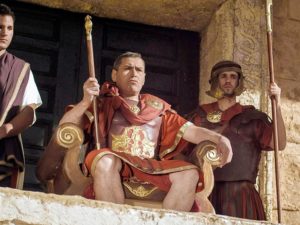Then the whole company of them arose and brought him before Pilate. And they began to accuse him, saying, “We found this man misleading our nation and forbidding us to give tribute to Caesar, and saying that he himself is Messiah, a king.” Luke 23:1-2
Not even a conscientious procurator should have to rise this early. Pilate barely has his eyes open all the way before his body servant brings word that the entire Sanhedrin (or so it seems) is standing on his porch. And here he’s been congratulating himself on getting through Passover without an incident. “What do they want?”
The servant isn’t sure. They have a prisoner . . .
Pilate groans. He takes his time getting dressed, makes them wait. They are in the outer courtyard, his servant says. He knows what that means—on certain holy days, they consider it defilement to cross the threshold of a Gentile. They must keep themselves lily-white. These Jews are the most arrogant people he’s ever encountered—with, to his mind, the least to be arrogant about. When he finally emerges from the shadows of his house, they all begin talking at once. He calls for a chair and raises a hand to quiet them.
“Where is the prisoner?”
The priests and scribes part down the middle. Pilate blinks in surprise. He was expecting a hulky, surly zealot like Barabbas, the notorious troublemaker awaiting execution. This man doesn’t look capable of overturning a sheepfold: shrunken, beat up, clad in a torn filthy garment—and utterly silent.
Jesus of Nazareth, is it? Pilate has instructed his men to keep an eye on him ever since that showy entrance into the city earlier in the week. But the man roused no rabble or called no one to arms; he only seemed interested in hanging around the temple and irritating the priests—a project the Governor heartily approves.
But regardless of sentiments he has a job to do. He forces himself to listen to the accusations: subverting the nation (pretty vague, that one) . . . opposing the payment of taxes (serious, if true) . . . claiming to be Messiah—
“Messiah?” he asks. Has heard the term, a little unclear on what it means.
“A king, your Excellency.”
That’s a stretch. Messiah has a more spiritual meaning, if he remembers correctly. “So,” he addresses the prisoner, “are you the ‘King of the Jews’?”
The term is a joke, whether the plaintiffs know it or not. The late unlamented Herod the Great called himself King of the Jews, but after he was dead Caesar determined that none of his surviving sons (survivors, more like) would take that title. But Pilate’s grim half-smile melts when the wretched prisoner raises his head. There is an unnerving stillness about him, rock-solid and ages deep, that pulls the Governor a little off balance.
“You have said it,” he whispers.
It’s almost—almost—as though the prisoner shares the joke. But Pilate senses no irony about him. Because on another level . . . he affirms it. As though he really were a king of some sort.
“He speaks with authority,” they said of him.
“What have you to do with us, Jesus of Nazareth? Have you come to destroy us?”
“Who is this, that the wind and sea obey him?”
Irritably Pilate shakes his head. This is ridiculous; anyone can see the man is harmless. Perhaps even “holy”—that austere word the Jews apply to their god. “I see no grounds for condemning this man,” he says, standing to reinforce that judgment.
But they won’t be dismissed so easily. “Your Excellency, he’s far more dangerous than he looks! He stirs up the people everywhere he goes, starting from his home in Galilee.”
“Galilee?” The word opens a door of escape; Galilee, that region of firebrands and zealots, is not his jurisdiction. “The man is Herod’s subject, and you’re in luck: Herod is in the city this moment. Take the man there. I’ve give you a detachment of guards. Now go—Go!”

An hour or so later, while finishing his breakfast, Pilate hears the sound he has dreaded ever since his posting to Judea: the rumble of a mob.
It has not been a peaceful morning; after the Jews reluctantly left the pavement, his wife declined to join him for breakfast. She wasn’t feeling well, her note said, adding this: I got almost no sleep last night. I kept dreaming of a bedraggled Galilean brought before you, and now I hear it’s true! Have nothing to do with him, I beg you.
And now another note, brought by his secretary:
To Pontius Pilate, procurator of Judea, greeting:
I rejoiced to receive Jesus of Nazareth from your generous hand, for I’ve heard much about him. The tales from Galilee are almost too rich to believe! But it seems I must use the term “rich” to describe the Jews’ fear of him. He may have performed “signs” for them in Galilee but it appears his bag of tricks is empty. He’s a harmless has-been, no threat to anyone. I suggest you have him flogged—that may satisfy the Jews—and let him go.
Your servant, Herod Antipas.
So here is the Nazarene, back again, sporting more bruises and a purple robe. That is an extravagant touch: Herod’s idea of a joke. Pilate never liked the old fox, but must admit Herod has offered good advice, even while shrugging the responsibility back to Rome. Flog and go: it’s time to bring this sideshow to a quick and decisive end.
From that day on, Pilate and Herod are friends. Funny thing: it’s the Nazarene who brought them together, like he brought the Pharisees and priests together. Opponents unified in opposition–and so it will ever be.
_____________________________________________________
For the original post in this series, go here.
<Previous
Next>




